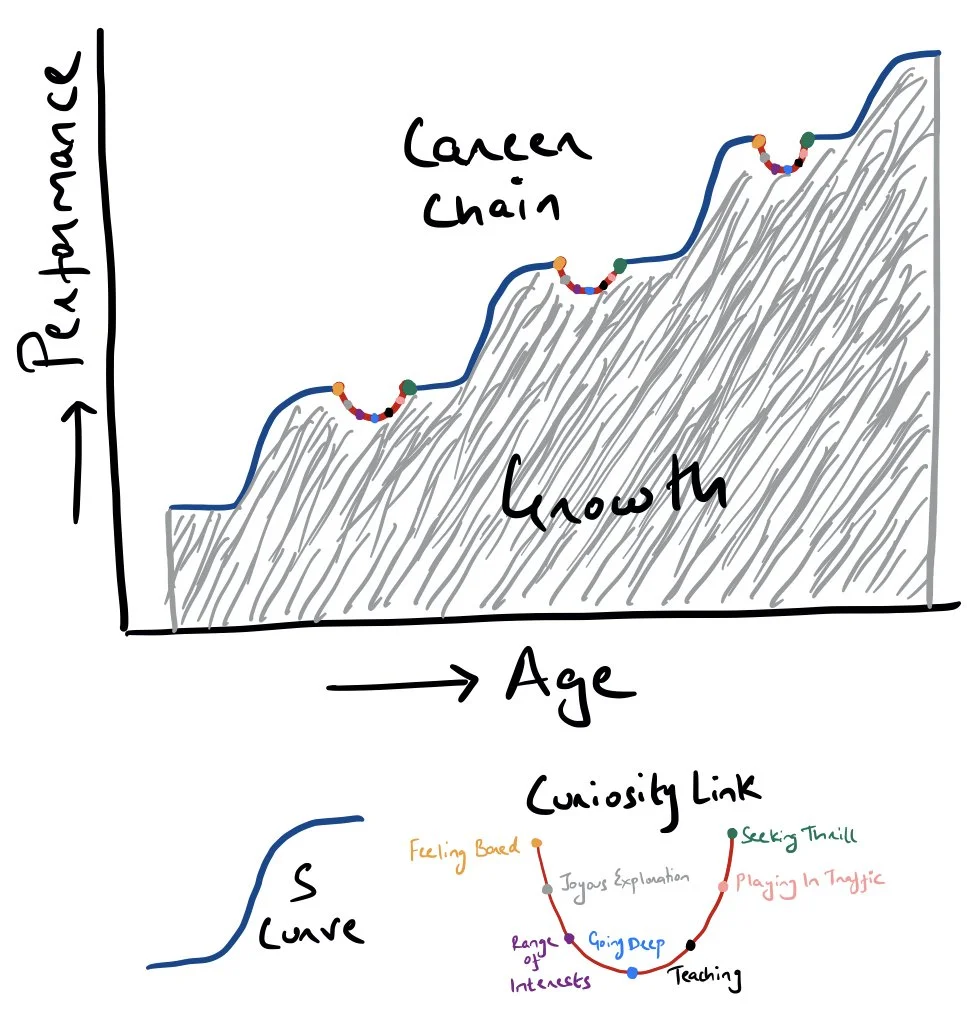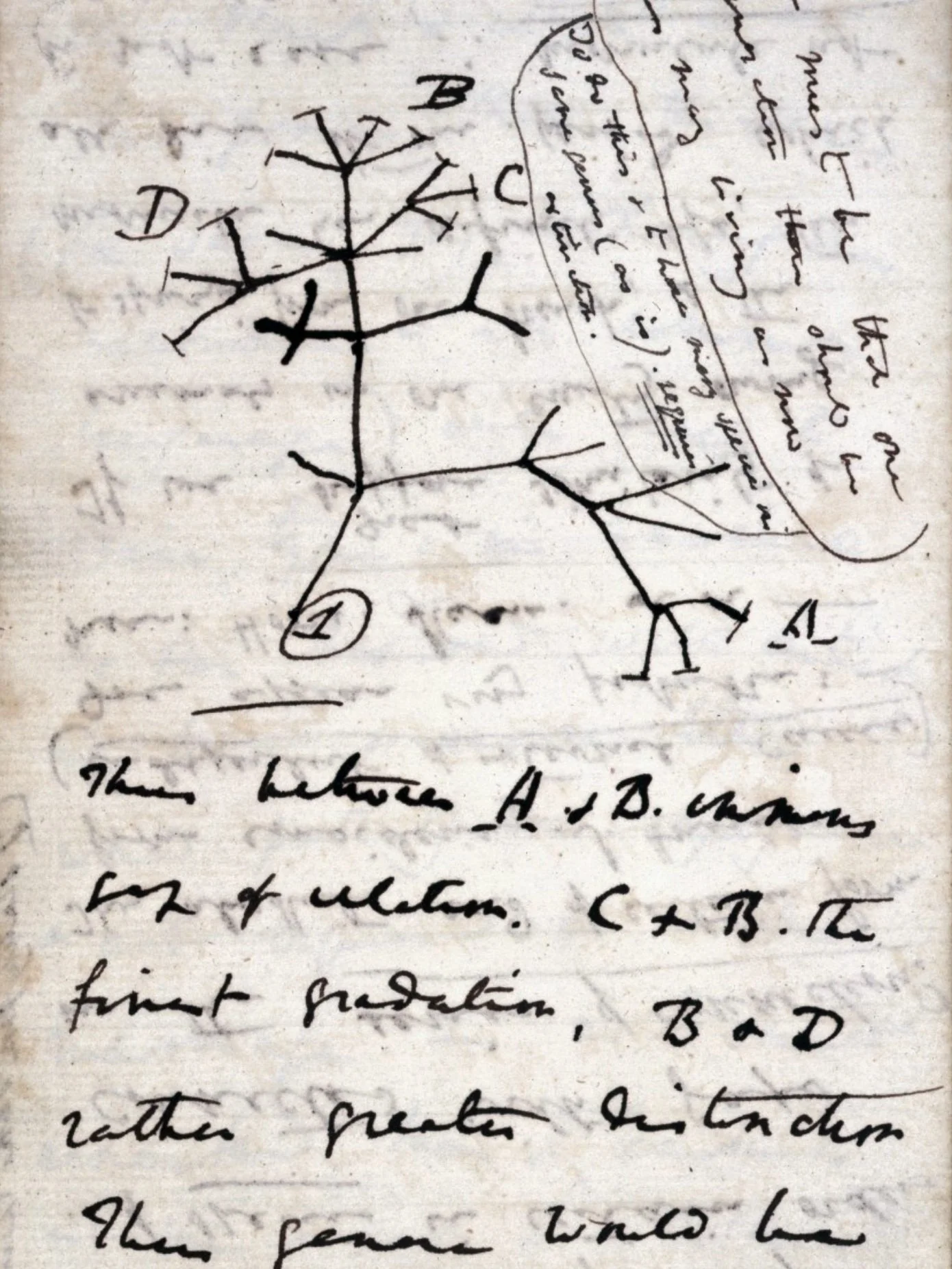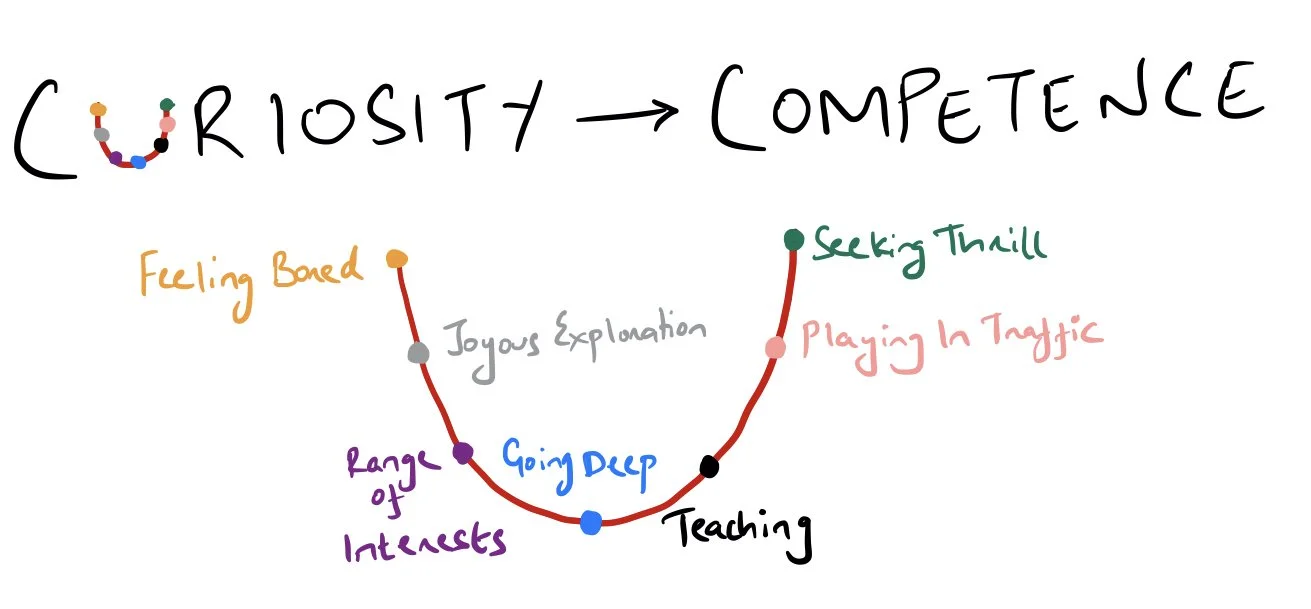Oil the links of curiosity to prevent a rusty career
“Nobody can beat you at things you are genuinely curious about. Specific knowledge is found by pursuing your curiosity rather than whatever is hot right now. Building specific knowledge will feel like play to you but will look like work to others.” - Naval Ravikant
In a previous blog post, I wrote about the rise of the growth collar surfer and how 21st century careers are going to be different. To be a successful worker today, we will have to be able to switch across a number of roles, jobs and industries, and ride multiple ‘S’ curves as part of our career chain. But how can we make this leap from one ‘S’ curve to another? By honing one of the most unique traits that make us human - our curiosity. Curiosity can act as links in the moving parts of the career chain. To prevent the career chain from wearing down and rusting, these curiosity links have to be lubricated. Well oiled curiosity links can make the moving parts of the career chain perform, move smoothly past each other, and make the ride of life be less clunky and more comfortable.
What is curiosity?
Humans have a number of drives. A drive to eat. A drive to drink. A drive to reproduce. Curiosity is no different. According to George Loewenstein, a professor of economics and psychology at Carnegie Mellon University, our insatiable drive to learn, invent and explore deserves to have the same status as other drives. In a 1994 paper, Loewenstein theorised that curiosity’s direction is determined by the “information gap,” the sudden awareness of what you don’t know and the immediate desire to fill that gap. Our brains are wired in a way that we feel rewarded and a sense of euphoria when acquiring new information. In addition to feeling rewarded, access to new information enables us to make better choices and adapt to a changing environment, helping us survive. Hence we are naturally driven to constantly seek new information.
The funny thing about curiosity is that it’s less about what you don’t know than about what you already do.
Source: https://nautil.us/issue/33/attraction/curiosity-depends-on-what-you-already-know
“But curiosity is not just wanderlust. We’re curious about specific things, and different people are interested in different things. Like the links on a Wikipedia page, curiosity builds upon itself, every question leading to the next. And as with a journey down the Wikipedia wormhole, where you start dictates where you might end up. Celeste Kidd, a cognitive scientist at the University of Rochester says that our brains instinctively seek “just right” levels of novelty. This is a bit like going to a bookstore. “You wouldn’t want to pick a children’s book, or a book you’ve read a lot before”. On the other hand, if you choose a book you can’t penetrate at all, like, say, a Russian textbook on astrophysics, you hit a similar problem. “That’s not going to be very interesting.” To learn, you have to have something to grab onto: The next handhold can’t be too far from the last—you might never reach it. So as your brain pushes you to gather information as quickly as possible, it instinctively steers you away from gaps that are too small, or too large.”
How curiosity fueled the careers of the greatest geniuses in history
What did Columbus, Da Vinci, Darwin and Jobs have in common? According to renowned biographer Walter Issacson, all of them were able to push the boundaries of ideas and make leaps of imagination that others in their time simply could not make. Each of them was born an ordinary human just like you and me but they did not let their curiosity fade. Instead, they found a way to develop it as a skill and make it their biggest strength.
Talent hits a target no one else can hit; Genius hits a target no one else can see. - Arthur Schopenhauer
The Mona Lisa by Leonardo Da Vinci
Da Vinci was the ‘Renaissance Man’ and wanted to understand everything one could possibly know about all things knowable. He cultivated a broad range of interests and was passionately interested about the smallest of everyday things. How do clouds form? What makes us yawn? How do birds fly? How does a woodpecker use its tongue? What makes water and air whirl? Why is the sky blue? And so on. He could think like an artist and a scientist, and for him, God was in the details. When he was painting the Mona Lisa, he was dissecting the human eye to see how light rays hit the different parts of the retina as well as dissecting the muscles and nerves that touch the lips to see whether a muscle that moves the lipstick also moves the eyebrow. Da Vinci’s curiosity was driven not because there was some utility to it, but because it delighted him.
The Columbian Exchange
Source: https://www.britannica.com/biography/Christopher-Columbus/The-first-voyage
Columbus was ambitiously curious and wanted to find new marine ways to explore the world. By carrying flora and fauna from the New World to the Old, and the Old to the New, Columbus began during his several voyages what scholar Alfred Crosby has called the Columbian Exchange. His exploratory expeditions unchained European curiosity from the vise put in place by the medieval church. It took something as dramatic as finding new lands filled with exotic people, plants and animals to liberate Europe's investigative spirit from official opprobrium. A new passion for collecting sped up the Columbian Exchange as kings, nobles and wealthy merchants created ‘cabinets of curiosity’ which they embellished with items found across the world. Over the two centuries that followed Columbus' initial voyage, robust questioning about the nature of the world turned an inward society outward, fueling an inquisitiveness that would eventually change the world forever.
Darwin’s note taking methods
Source: https://commons.wikimedia.org/wiki/File:Darwin_Tree_1837.png
Darwin was an independent thinker, a great scientist and the most influential biologist in history. In 1859, he put forward the theory of evolution by natural selection which has lasted the test of time and is the best available and most widely accepted explanation of the way life developed on earth. While Darwin was obsessively curious about specimens from the natural world, he trained his curiosity by combining extreme focus and attentive energy to form a working method. He was a relentless notetaker collecting, sorting and storing every piece of information (especially ones that contradicted his ideas and ways of thinking) that was related to his topic of interest.
"You can’t connect the dots looking forward; you can only connect them looking backwards. So you have to trust that the dots will somehow connect in your future. You have to trust in something — your gut, destiny, life, karma, whatever. This approach has never let me down, and it has made all the difference in my life." - Steve Jobs
As a result of pursuing his curiosity in different fields throughout his life, Steve Jobs developed an extremely unique perspective, skillset, and network; one that no one else in the computer industry had. He was a creative genius with the ability to apply imagination to any situation. He turned these unique advantages into the largest company in the world by having a razor sharp focus. Within Apple, he cut out people, products, and systems that weren’t world-class.
Source: this-is-the-1-predictor-of-career-success-according-to-network-science
Transforming curiosity into competence: Being a disciple of experience, experiment and persistence
To make the leap from one ‘S’ curve to another, we have to first build our muscles of curiosity and then convert that curiosity into competence. For that, we have to traverse the journey from feeling bored to seeking thrill.
Be aware when you’re bored. Boredom is a signal from your brain that you’re not making good use of a part of the brain. Boredom can be a trigger for curiosity.
Slow down and explore with joy. Be consumed with wonder about the patterns of nature and the fascinating features of the world. Take the time to let your mind wander and let questions pop into your head. A beginner's mind needs beginner's time. Keep a notebook.
Develop a broad range of interests. Read outside of your field: pick a type of book you would never naturally buy in a bookstore. Is it classic poetry? Non-fiction? A cookbook? Something about geology? Read it just for the sake of reading it.
Go deep and build specific knowledge. Select a topic that you find interesting and push the limits of your curiosity. This means reading lots of articles, books, and research papers, watching TED talks, listening to podcasts, and even writing about the topic. Build a method to organise all the information you come across.
Hang out with kids and teach. If you can explain something to a 5 year old, it means you know your stuff. Use the Feynman technique as a way to refine your understanding of different topics.
Get inquisitive with people, play in traffic and be in an open network. According to multiple, peer-reviewed studies, simply being in an open network instead of a closed one is the best predictor of career success. The more open a network, the more exposure you get to new ideas. Some of the biggest career inflection points come from chance meetings so push yourself to be out there to talk, listen, observe and get involved.
Seek thrill and take stretch assignments. Be willing to take physical, social, and financial risks to acquire varied, complex, and intense experiences.
As children, we are all naturally born curious. This curiosity needs to be protected and nurtured throughout our career so we can make our own leaps of imagination to become successful. Wonder like Da Vinci. Ignite ambition like Columbus. Hone a method like Darwin. Connect the dots like Jobs.








